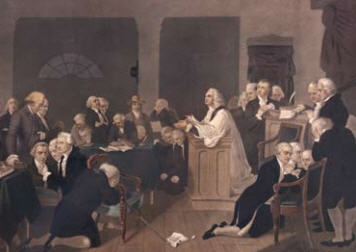Does the Constitution Require Least-Common-Denominator Prayer? By Daniel Blomberg, Legal Counsel at the Becket Fund for Religious Liberty
Media Contact
Ryan Colby 202-349-7219 media@becketlaw.org

By Daniel Blomberg, Legal Counsel at the Becket Fund for Religious Liberty
Today’s oral argument before the U.S. Supreme Court in Town of Greece v. Galloway revealed a stark choice between allowing government to include diverse religious views and forcing government to exclude all but one governmentally approved religious view. At issue was the centuries-old practice of legislative bodies opening their meetings with prayer. The Founders’ understanding of that practice was the subject of the Becket Fund’s amicus brief, which the Town’s counsel cited at today’s argument. Even though the Supreme Court gave its constitutional blessing to legislative prayer decades ago, advocacy groups have tried to chip away at it by intimidating small municipalities into prayer-less silence. In 2008, though, the Town of Greece called the groups’ bluff, and has vigorously litigated against them ever since.
The Town has a prayer policy that invites anyone in the community, regardless of their faith or lack thereof, to open a Town Board meeting with a brief prayer that reflects that person’s own religious beliefs. In short, the Town embraces and celebrates religious diversity by opening its doors to everyone.
But today, the advocacy groups openly argued for a constitutionally mandated rule that excludes huge swaths of the community. They want government officials to allow only a kind of least-common-denominator prayer—that is, prayers using religious words and ideas that the current majority of faith groups find generally pleasing. The plaintiffs admitted that this rule would automatically exclude whole minority faith groups and anyone whose faith instructed them to pray in a faith-specific way. Their approach would ban Muslims from praying to Allah, Christians to Jesus, or Jews to the God of Abraham, Isaac, and Jacob. Only government-approved prayers to the government-approved god would be permitted. In short, the advocacy groups want to force the government to privilege majoritarian religious feelings over open forums for authentic expressions of faith (or non-faith).
Many of the Justices found this troubling. Several warned that it would “very heavily” involve bureaucrats in parsing prayers, which would likely be unconstitutional. Another noted that the advocacy groups’ constitutionally dubious standard operated on a sliding scale, excluding all prayers but those that reflect a given majority of beliefs at a certain time. That malleable, litigation-inviting standard would most likely force government entities (starting with towns with strapped budgets) to ban legislative prayer altogether—a result that one Justice commented would “misrepresent[] who we really are” as a people, and which another Justice worried could make the Court appear “hostile” to religion generally. Two Justices also noted that plaintiffs’ intentionally exclusionary approach would run contrary to the religious and social harmony that the First Amendment fosters.
The last word at today’s argument was one of the best, where counsel for the Town said, “Americans are not bigots and we can stand to hear a prayer delivered in a legislative forum by someone whose views we do not agree with.” He was paraphrasing Founding Father Samuel Adams’ speech in favor of legislative prayer, where Adams quelled objections by stating that “he was no bigot, and could hear a prayer from any gentleman of Piety and Virtue, who was at the same time a friend to his country.” The Congress that Adams persuaded was the same Congress that then crafted the First Amendment. From our founding, our nation has always preferred to include religious voices in the public community instead of excluding them.